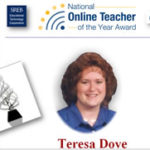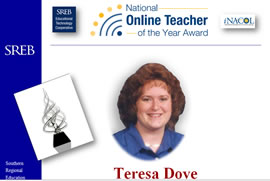
Educators who teach in an online setting should foster strong relationships with their students’ parents and should offer plenty of positive feedback, says the nation’s first-ever K-12 Online Teacher of the Year.
Teacher Teresa Dove of the Florida Virtual School (FLVS) last week was chosen as the first winner of this new award, which not only recognizes excellent teaching but also the prevalence, and importance, of online learning across the country.
The award, which recognizes an “outstanding online teacher for exceptional contributions to online K-12 education,” was created by the Southern Regional Education Board (SREB) and the International Association for K-12 Online Learning (iNACOL).
According to Myk Garn, director of SREB’s Educational Technology Cooperative, the award program evolved from a regional program run by the Educational Technology Cooperative in 2009.
The cooperative wanted to recognize the increasing competence of online instructors at the virtual schools in the Southeast, and it asked each state virtual school to nominate one of their teachers who personified excellence in online teaching. Eleven teachers were honored by the cooperative and their respective organizations last year.
Recognizing that the number of online teachers was growing nationwide, and that the degree of skill, performance, and success of their teaching was evolving as well, the cooperative—which has worked closely with iNACOL on a number of online-learning quality initiatives before, including guidelines for high-quality online teaching—crafted a plan for a national award for 2010.
The Higher Education Opportunity Act “defined distance learning (for the postsecondary world) as where the teacher and the student are ‘separated’ from each other. I’d argue they—as bureaucrats are wont to do—got it exactly wrong,” said Garn. “It is where the teacher and the learner are connected by technology.”
Ultimately, “teachers are the common denominator in instructional quality, whether in the classroom or online, and that is what we wanted to recognize,” he added.
The judging committee selected Dove, a Virginia resident who teaches math online for FLVS, and two other finalists from more than 50 nominations of online educators in public schools and state virtual schools in 24 states.
Dove, who made distance education her focus and life’s ambition long before she began teaching online, attained both her master’s and doctoral degrees online, studying Instructional Technology and Distance Education.
“For years, I had a dream of being able to teach students using web-based technologies, and FLVS allowed me the opportunity to fulfill this dream. That was 4.5 years ago, and I have never looked back,” she said.
For the past four years, Dove has been an online mathematics/Algebra II teacher for grades 6-12 and a schoolhouse Literacy Coordinator at FLVS, which serves more than 125,000 students and employs more than 1,100 educators. A resident of North Tazewell, Va., she is a mentor, a member of the Reading Leadership Team, and was the first Algebra II teacher at FLVS to create a Model Literacy Classroom.
Dove said that teaching online allows her to spend much more time working individually with students than she did previously in a traditional classroom. Spending only a moment with students in a traditional classroom is “not enough, and our kids deserve better,” she said. It also has allowed her to care for two young children at home and to teach while caring for her mother in the hospital.
She explained that the big key to success for being an online teacher is to get to know your students.
“You might be separated geographically, but spending that one-on-one time with the kids is the biggest asset for an online instructor,” she said. “Not only does it personalize their educational experience, it lets them know that someone is there who cares for them. Education should be centered around the student, and when they feel that, you would be amazed at how motivated they will become and how much you will learn about them.”
For Dove, their are five practices that she says make her effective:
1. Keep the student at the center of every decision that needs to be made.
2. Foster relationships with students and parents, because parents can be a teacher’s biggest help.
3. Talk with your students every day by phone. Dove said that the majority of her day is spent talking directly with students to build a one-on-one relationship with each of them.
4. Celebrate every effort and success, no matter how big or small.
“Always be positive in your feedback, even if the assignment may not be stellar. The written word is so powerful online, and you always want your students to feel that you are cheering them on and appreciate their hard work,” she explained.
5. Build relationships with fellow teachers. Share resources, best practices, and stories to feel less isolated or alone in the home office.
“This is one of the greatest things about my Algebra II department,” said Dove. “There is always someone there to give advice, lend a helping hand, or share something they have created.”
According to SREB and iNACOL, criteria for the award included the skills for high-quality online teaching as defined by the two organizations, as well as the ability to (1) inspire students of all backgrounds and abilities to learn; (2) have the respect and admiration of students, parents, and colleagues; and (3) play an active and useful role in the community as well as in the online classroom. Judges also reviewed submissions and comments from parents and students.
Judges included Bruce Friend from SAS Pathways, Darcy Hardy of the University of Texas System, Cathy Cheely from Virtual Virginia, Themy Sparengus from the Los Angeles Unified School District, and Patrick Perkins from FLVS.
Garn said Dove stood out as an excellent online teacher not just for her qualifications, but from the comments received from students and parents.
“Dr. Dove truly has a teacher’s heart. Her love and gift for teaching is obvious in all that she does to teach and encourage her students. I am very grateful to her for being such a wonderful teacher to my son,” wrote one parent.
“In the beginning, I thought that [taking an online course] was going to be very difficult, but I am happy to say that I have completed the Florida Virtual course with an A,” said student Aerial Baez. “One of the main reasons for my success was having a teacher as wonderful and dedicated as Dr. Dove. She was always very understanding and readily available to answer all my questions. In fact, I was usually amazed at how quickly she responded. When I did a good job on an assignment, she would always congratulate me; when there were errors, she would take time to explain where I went wrong. I looked forward to her words of encouragement and positive feedback. She would even go the extra mile and add a funny cartoon to her eMails to motivate her students.”
“As web-based learning continues to expand, SREB and iNACOL are proud to honor Teresa Dove and the two other finalists as outstanding K-12 online teachers of America’s students,” said Garn.
The other finalists for the award were Gabrielle Bray from the Gwinnett County, Ga., Online Campus and Steven Sproles from Virtual Virginia. Bray and Sproles received special plaques and other honors.
Dove, Bray, and Sproles were recognized at a Sept. 8 dinner during SREB’s joint annual meeting of its Educational Technology Cooperative and Electronic Campus state representatives. The meeting brings state officials from the 16 SREB states together to improve the use of technology in education.
Dove received an art glass sculpture designed by Hans Frabel and an all-expenses-paid trip to the Virtual School Symposium sponsored by iNACOL, Nov. 14-16 in Glendale, Ariz., where she will be recognized during iNACOL’s annual meeting. She also will be featured on the SREB and iNACOL web sites.
As the social studies department chair at the Gwinnett County Online Campus, based in Norcross, Ga., Bray teaches a variety of social studies courses to grades 9-12, including honors and college-preparatory courses. In her seven years of online teaching, Bray has built strong mentoring relationships with her students and “has improved students’ scores on the Georgia End of Course Test in economics” above state averages for several years, noted her principal.
Sproles of Wise, Va., teaches Advanced Placement (AP) psychology, macroeconomics, and microeconomics at Virtual Virginia, based in Richmond. Hired as Virtual Virginia’s sole AP psychology teacher in 2006, Sproles led the development of a new AP psychology course that expanded the number of teachers teaching the course and helped boost student achievement.
In 2009, only 69 percent of students passed the AP psychology exam across the nation. “In comparison, 84 percent of Sproles’ students passed that exam that year,” his instructional leader noted.
“These teachers have risen to the top of the online teaching field and are making strong contributions to creating a 21st-century learning experience for every one of their students,” said Susan Patrick, president and CEO of iNACOL. “We are grateful to them, and we hope this award captures the spirit of the community.”
According to Dove, although some people still question the effectiveness of online instruction, the award helps recognize teachers who are making a true difference with their students.
“Whether it be through student test scores, completion rates, or student/parent survey information, all of the finalists were able to show that online learning is just as effective, if not more effective, than the traditional classroom. It is so exciting to be part of an evolving, dynamic field that puts the student at the center of everything we do,” she said.
Sponsors of the award include Aventa Learning, FLVS Global Services, and the Pearson Foundation.
Nominations for the 2011 competition are due Dec. 6 and can be submitted here.
Note to readers:
Don’t forget to visit the Online Learning: One Pathway to Success resource center. A growing number of K-12 school systems are discovering the power of online learning to transform education as we know it, opening up nearly limitless possibilities for their students. Go to:
Online Learning: One Pathway to Success
- ‘Buyer’s remorse’ dogging Common Core rollout - October 30, 2014
- Calif. law targets social media monitoring of students - October 2, 2014
- Elementary world language instruction - September 25, 2014



Comments are closed.